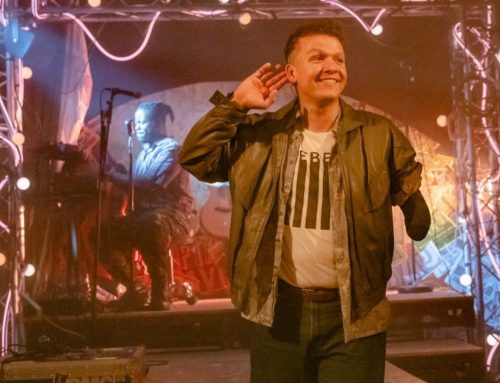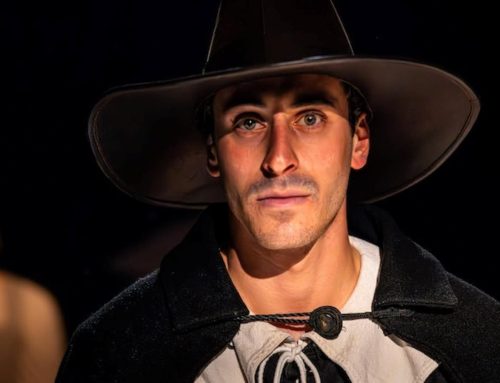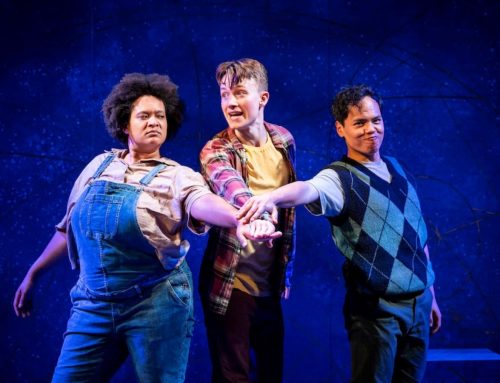In July 1945, after VE day and shortly before the United States detonates atomic bombs over the Japanese cities of Hiroshima and Nagasaki, ten of Germany’s most talented physicists and chemists, including three Nobel Prize winners, Werner Heisenberg, Professor Otto Hahn, and Max von Laue are flown to the UK.
Confined incommunicado in Farm Hall, a country pile near Cambridge, they are restricted from leaving the grounds (even signing a gentleman’s agreement to that effect) and left to reflect on the collapse of the Nazi regime and their own part in Hitler’s rule. For six months their conversations are clandestinely taped and transcribed, a possibility which seems genuinely not to occur to several of the brightest brains on the planet. The objective is to find out how close ‘Hitler’s Uranium club’ as the group are known have come to creating Germany’s own nuclear device.
Alan Brody’s Operation Epsilon, a decade old and here in its UK premier at the Southwark Playhouse, does an efficient job in bringing some drama to the scientists’ incarceration. The questions that the piece poses about the moral implications of pursuing research destined to open the door to a device of mass destruction, echo those in the recent Hollywood blockbuster Oppenheimer. Katherine Moar’s Farm Hall, seen this spring at the Jermyn Street Theatre, covers the exact same events rather more economically.
Heisenberg (an excellent Gyuri Sarossy who twitches like a demented sparrow), much the most morally ambiguous of Brody’s solidly drawn characters, takes de facto leadership of the group, which soon fractures along dramatically satisfying lines: young versus old, Nazi versus apolitical, chemist versus physicist. “England is almost tolerable in the summer” says party member Dr Erich Bagge (a fittingly querulous Matthew Duckett), but tolerance is soon in short supply.
News of America’s successful bomb hits the assembled scientists with the force of a well-aimed grenade. For some, initial disbelief gives way to competitive fury; “What matters is the world knows now we’re second rate” says one, despairing of how future generations will judge them. For Nazi apparatchik Kurt Diebner (Simon Rhodes) the group’s prior failure to work together to supply Hitler with the same capability is the main regret.
For Hahn (a stately turn from Nathaniel Parker), whose 1938 discoveries directly opened the door to nuclear fission, it is the terrible human consequences that press most. “You’re not responsible”, a colleague tells the distressed professor as he learns of Hiroshima’s destruction. But if he is not, then who is? Moral compass von Laue (Simon Chandler on absolute top form) is on hand to remind the assembly that they should never have been working for Hitler in the first place; “we must all testify to our guilt” he demands.
Brody packs a lot into the 90-minute piece, something which necessitates occasionally clunky exposition of the “you’re considered the most brilliant physicist of your generation” type. What comes across most effectively is the towering egos of a group of driven and ambitious men who, in the main, prioritise their own reputations over the ethical consequences of the work they have undertaken.
“It’s very dangerous if people think we were working on a bomb” says Heisenberg, who determines the group needs to issue a memorandum sanitising the objectives of their own nuclear research, while at the same time making clear they were not complete fools. Heisenberg’s unsubtle aim is to “turn mistakes into heroics” and hint that they were working against Hitler all along: “our version must be the one the world hears”, he says. But will the allies, listening in to every conversation and embodied in the form of British Major Rittner (Simon Bubb effectively channelling many a stock war-movie officer) buy it?
Janie E Howland’s set, green and purple country-style chic set over two levels, is gorgeous, but feels a little too sumptuous for immediate post-war Britain. The same goes for the impressively well-stocked drinks trolley and Beth Colley’s noticeably too smart costumes. Six months here in this environment feels like a rather more attractive proposition than one imagines it probably was.
Director Andy Sandberg is skilful at choreographing the comings and goings of the cast of eleven. The first half’s pedestrian pace picks up noticeably in the second to deliver some satisfyingly direct Teutonic conflict. Many of the original 1945 Farm Hall recordings and transcripts are missing from the historical record and one supposes quite a lot of dramatic licence goes into Brody’s narrative. Nevertheless, Operation Epsilon is an interesting and engaging true story, well told.
Writer: Alan Brody
Director: Andy Sandberg
This review first appeared in The Reviews Hub
More Recent Reviews
The Sea Horse. Golden Goose Theatre.
The Sea Horse, Edward J Moore’s grim slice of mid-century realism, debuted to solid reviews off-Broadway in 1974. Since [...]
Garry Starr: Classic Penguins. Arts Theatre.
Emperor penguins’ shortish treks between sea and nesting sites are about as peripatetic as your average Thameslink commuter. Garry [...]
When the Clarion Came to Call. Cockpit Theatre.
When, upon entering an auditorium, you are told, ‘Take as many pictures as you like, but mind the ceramics,’ [...]





